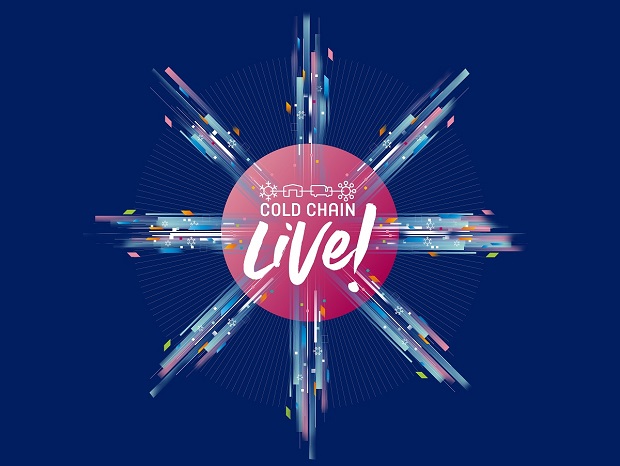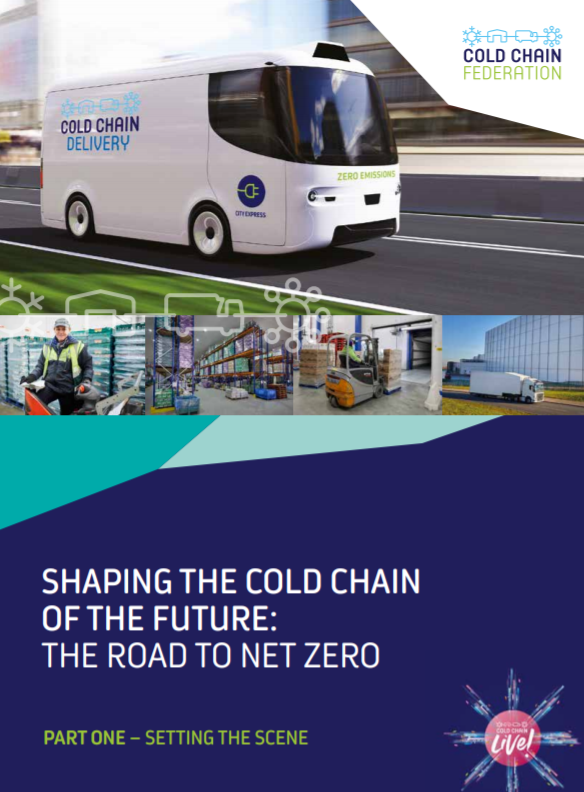The Cold Chain Federation has today published Shaping the Cold Chain of the Future: The Road to Net Zero, a new report that examines how the UK cold chain can start a collaborative journey towards becoming a Net Zero industry.
 Today’s new report opens four weeks of discussion, workshops and research led by the Federation for its Cold Chain Live! Towards a Net Zero Cold Chain virtual event series. It marks the launch of the Cold Chain Federation’s Net Zero project, a long term commitment to guide the Federation’s members through the challenges posed by the UK Government’s pledge to achieve a Net Zero economy by 2050.
Today’s new report opens four weeks of discussion, workshops and research led by the Federation for its Cold Chain Live! Towards a Net Zero Cold Chain virtual event series. It marks the launch of the Cold Chain Federation’s Net Zero project, a long term commitment to guide the Federation’s members through the challenges posed by the UK Government’s pledge to achieve a Net Zero economy by 2050.

The first week of Cold Chain Live! Towards a Net Zero Cold Chain will examine the theme of ‘Defining Net Zero’. As well as the new report and a series of thought leadership papers and expert blogs published on the Cold Chain Federation website today (Monday 28th September), the ‘Defining Net Zero’ theme will also be explored this week on:
- Wednesday 30th September in an interview-style discussion between Tim Moran, Managing Director UK of Lineage Logistics, and Cold Chain Federation Chief Executive Shane Brennan; and
- Friday 2nd October through a virtual workshop featuring Cold Chain Federation Policy Director Tom Southall, Kuehne University Professor of Logistics Professor Alan McKinnon, and Star Refrigeration’s Dr Rob Lamb.
In today’s Shaping the Cold Chain of the Future: The Road to Net Zero report the Federation sets out key challenges across different elements of the UK cold chain, including the global nature of the industry, the need to manage energy in cold stores differently and the need to reduce emissions in temperature-controlled distribution. The report also details research priorities in each of these core areas.
Cold Chain Federation Chief Executive Shane Brennan says: “The cold chain is a force for climate good, helping tackle major global issues such as over-production, deforestation and food waste. As the cold chain grows ever more important worldwide, it is vital both commercially and environmentally that our industry stands ready to provide its services in an environmentally sustainable way. The ultimate ambition is a Net Zero cold chain, and this report marks the start of the Cold Chain Federation’s long-term commitment to bringing our industry together and setting out the path to Net Zero.”
The report identifies that the pathway to Net Zero for the UK cold chain will include five key stages:
- Reducing the energy required for cooling
- Technological advances to reduce direct emissions
- Supply-chain wide collaboration
- Developing better ways to manage energy and waste heat
- Powering remaining cooling load from sustainable sources.
The subsequent weeks of Cold Chain Live! Towards a Net Zero Cold Chain will explore the relationship between Net Zero and changing customer requirements, vehicles in the cold chain, and cold chain infrastructure. Informed by the discussions over the next four weeks, in early 2021 the Cold Chain Federation will continue its Net Zero project by publishing a comprehensive report developing the concepts introduced in today’s paper and setting out recommendations for how to tackle the behavioural, structural and political hurdles to achieving Net Zero.
Cold Chain Federation Policy Director Tom Southall says: “Naturally, the ongoing chaos wrought by Covid and the anticipation of serious disruption as a result of new post-Brexit customs arrangements next year are front of mind for cold chain businesses right now. But as regulation becomes increasingly stringent and energy prices continue to rise, the Net Zero challenge is one that we, as an industry, must tackle and there is no time to lose. Through our new Net Zero project, the Cold Chain Federation will be providing advice and support for our members every step of the way.”
- Today’s new report Shaping the Future of the Cold Chain: The Road to Net Zero can be downloaded free at https://www.coldchainfederation.org.uk/road-to-net-zero/
- Find out more about the virtual Cold Chain Live! Towards Net Zero events and sign up to attend the free virtual workshops at www.coldchainfederation.org.uk/events
- To discuss collaborative opportunities on the path to Net Zero with the Cold Chain Federation, email info@coldchainfed.org.uk




Comments are closed.